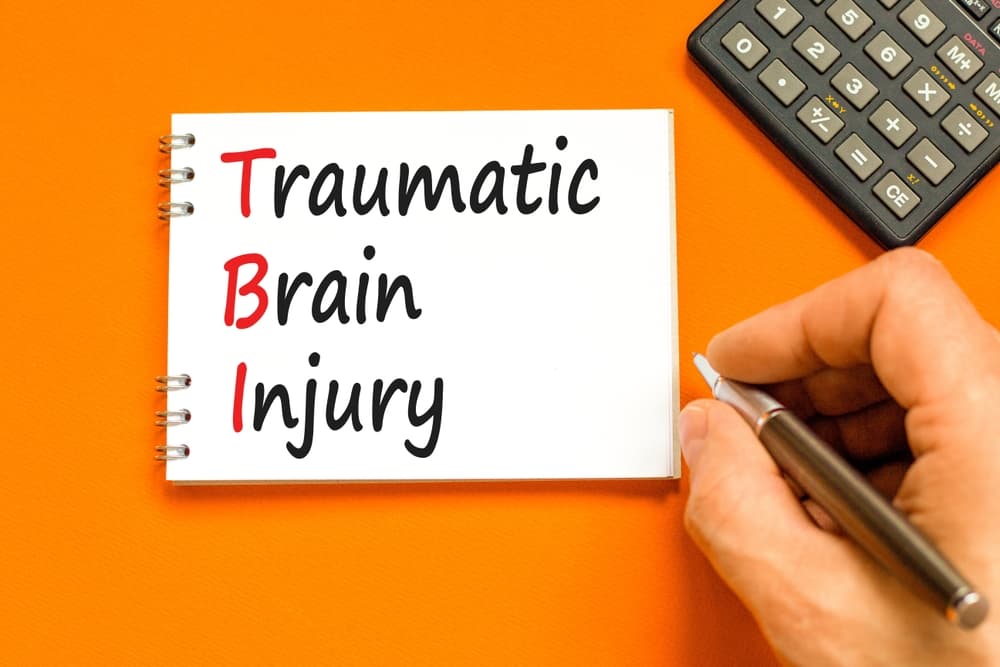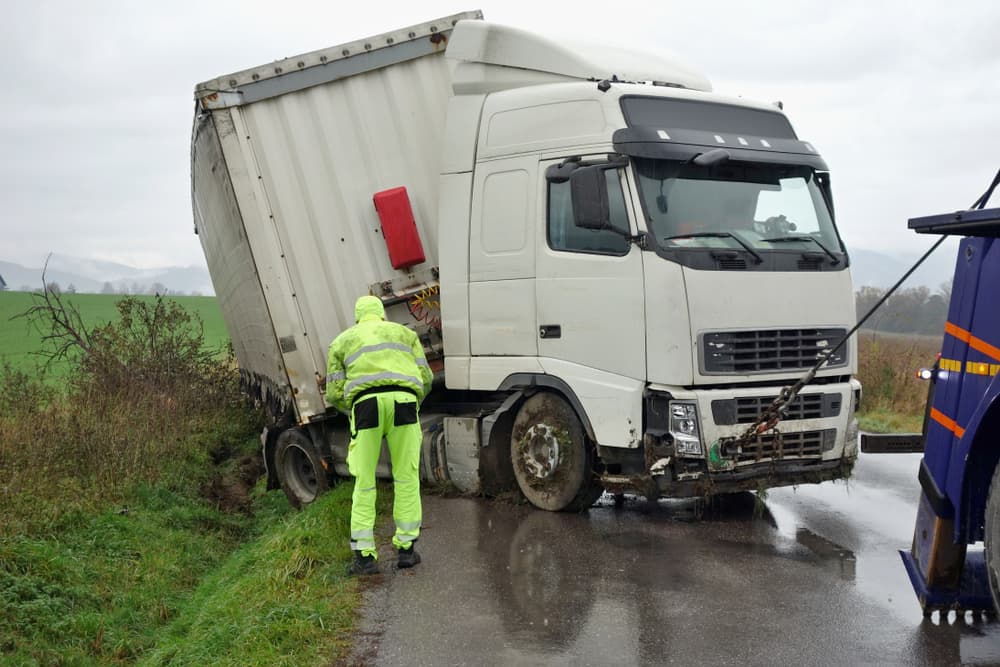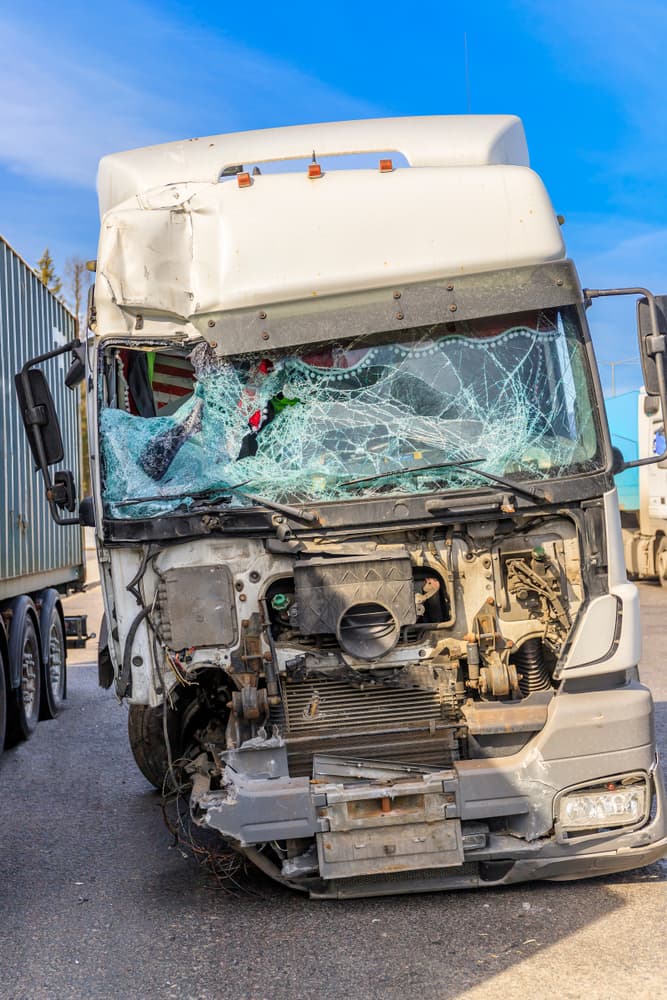Accidents involving large commercial trucks, including big rigs, tractor-trailers, and 18-wheelers, frequently happen when truck drivers and trucking companies act negligently. When a large truck hits a much smaller vehicle at a high rate of speed, the consequences are frequently devastating and sometimes deadly.
If you or a person you love suffered injuries in a recent truck collision, you have legal options available. A skilled truck accident attorney can review your accident circumstances and determine your options for moving forward. Your lawyer can then handle every step of the process for you and work to obtain the full compensation you deserve.
How do Truck Accidents Happen, and Who is Responsible?
Truck accidents are often catastrophic, leading to severe injuries, loss of lives, and significant property damage. Several common causes contribute to these accidents, with various parties bearing responsibility.
- First, truck driver error stands out as a primary cause. Fatigue, distraction, and speeding are common factors. Long hours on the road can lead to driver fatigue, impairing judgment and reaction times. Distractions such as cell phones or onboard technology can further divert attention, while speeding increases the likelihood of accidents due to reduced control over the vehicle.
- Second, adverse weather conditions significantly contribute to truck accidents. Storms, heavy rain, snow, and fog can affect visibility and make roads slippery, increasing the chances of a collision. Truck drivers must adjust their driving behavior to accommodate these conditions, and failing to do so can lead to accidents for which they are liable.
- Next, equipment failure or malfunction poses a significant risk. Trucks undergo extensive wear and tear due to long hours on the road, inadequate maintenance, or manufacturing defects. Brake failures, tire blowouts, or steering malfunctions can result in loss of control and accidents. Both trucking companies and manufacturers share responsibility for ensuring that vehicles are properly maintained and meet required safety standards.
- Inadequate infrastructure and road design may also contribute to truck accidents. Poorly maintained roads, lack of signage, and inadequate lighting can create hazardous conditions – especially during adverse weather. Agencies responsible for road maintenance and design bear some responsibility for accidents resulting from these factors.
- Lastly, trucking company negligence can lead to an accident. Trucking companies are responsible for hiring and retaining only safe and capable drivers. When they fail to do so, and an accident occurs, they may be responsible for the resulting accident along with the driver. Additionally, trucking companies can be responsible for accidents resulting from various motor carrier violations – especially loading/unloading procedures and securing truck cargo.
A knowledgeable truck accident lawyer can identify all potentially responsible parties in your accident scenario and take the necessary legal steps on your behalf.
Common Injuries in Truck Collisions
Truck accidents can cause severe injuries, often affecting victims physically, mentally, and emotionally. The sheer size and weight of trucks make these accidents particularly dangerous, leading to a wide range of serious injuries.

- Traumatic brain injuries (TBIs) occur when a sudden impact causes damage to the victim’s brain, leading to symptoms like headaches, confusion, and loss of consciousness.
- Spinal cord injuries are also common, potentially resulting in partial or complete paralysis.
- Broken bones are another frequent outcome, particularly in the arms, legs, and ribs, due to the forceful impact of the truck collision.
- Internal injuries, including damage to organs like the liver, spleen, or kidneys, can occur as well. These injuries may not be immediately visible but can be life-threatening if not treated promptly.
- Whiplash, a common neck injury, happens when the victim’s neck gets jerked violently, leading to stiffness, pain, and reduced range of motion.
Beyond physical injuries, truck accidents can cause significant mental trauma. Many survivors experience post-traumatic stress disorder (PTSD), characterized by flashbacks, nightmares, and severe anxiety. This condition can profoundly affect a person’s daily life, making it difficult to perform routine activities or return to driving. Depression and anxiety are also common, as the trauma of the accident can lead to persistent feelings of sadness, hopelessness, and fear.
Emotionally, the effect of truck accidents can also be devastating. Victims often endure intense emotional distress, including feelings of anger, frustration, and helplessness. This emotional toll can also strain relationships with family and friends, leading to isolation and loneliness.
Coping with these injuries often requires medical care, physical therapy, and sometimes psychological support. An experienced truck accident lawyer can handle the legal steps of your case while you focus on making a full recovery.
Important Evidence to Prove Negligence in a Truck Accident Case
Proving negligence in a truck accident case requires collecting and presenting important evidence. This evidence is crucial in establishing that the truck driver or other involved parties failed to exercise reasonable care, leading to the crash. Several key types of evidence are essential for building a strong case.

- Police reports are fundamental. When an accident occurs, police officers typically arrive at the scene to document the incident. Their reports include details like the time, location, and conditions of the accident and statements from the involved parties and witnesses. Police reports often contain the officer’s initial assessment of fault, which can be valuable in proving negligence.
- Witness statements provide firsthand accounts of the accident. Witnesses can offer objective perspectives on how the crash happened, corroborating the victim’s version of events. Their testimonies can be critical – especially if they observed reckless or negligent behavior by the truck driver or other parties.
- Photographs and videos from the accident scene are powerful pieces of evidence. These visuals can capture the extent of the damage, road conditions, traffic signals, and the positions of the vehicles involved. Photos and videos help to recreate the accident’s circumstances, making it easier to demonstrate how negligence occurred.
- Data from the truck’s electronic logging device (ELD) can be instrumental. ELDs record information about the truck’s speed, braking patterns, and hours of operation. This data can reveal whether the driver was speeding, failing to brake adequately, or violating hours-of-service regulations, all of which point to negligent behavior.
- Medical records are crucial in showing the extent of injuries sustained in the accident. These documents link the injuries directly to the crash, providing evidence of the harm resulting from the negligent party. Detailed medical records help to establish the severity of the collision and the resulting physical and emotional suffering.
- Truck maintenance and inspection records can also be important. Regular maintenance is vital for safe operation, and records showing neglect or improper upkeep can support negligence claims. If the accident was due to mechanical failure, these records can help prove that the trucking company or driver did not maintain the vehicle properly.
- Expert testimony may strengthen a negligence case. Accident reconstruction experts can analyze the evidence and provide professional opinions on how the accident occurred and who was at fault. Medical experts can testify about the injuries and their effect on the victim’s life.
Recovering Compensation for Injuries Sustained in a Truck Accident
Recovering compensation for injuries in a truck accident is essential for victims to cover the losses they endure. This compensation can come from various sources, such as insurance claims or legal settlements, and it helps address the crash's financial, physical, and emotional effects.
Victims can recover several types of compensation, commonly categorized as economic, non-economic, and, in rare cases, punitive damages.
- Economic damages are relatively straightforward and cover quantifiable losses. Past and future medical bills often make up the bulk of economic damages. Lost income is another critical component, compensating for the income a victim loses while recovering from their injuries. If the injuries are severe enough to affect the victim’s ability to work long-term, they may also receive compensation for loss of earning capacity.
- Non-economic damages compensate for more subjective losses with no specific monetary value. Pain and suffering encompass the physical pain and emotional distress resulting from the truck accident and injuries. This can include ongoing pain, discomfort, anxiety, depression, and reduced quality of life. Victims may also receive compensation for loss of life enjoyment, which addresses the inability to participate in activities and hobbies they once enjoyed. In cases where the accident leads to significant lifestyle changes, such as the loss of companionship or inability to maintain personal relationships, victims can also seek compensation for these profound effects.
- Punitive damages are less common but may be available in cases where the negligent party’s actions were particularly reckless or egregious. These damages punish the wrongdoer and prevent similar wrongful behavior in the future. For instance, if a truck driver was intoxicated or knowingly violated safety regulations, the court may award punitive damages to emphasize the severity of their misconduct.
A skilled truck accident lawyer can navigate the legal process for you, gather necessary evidence, and negotiate with insurance companies or opposing parties.
Steps to Litigate a Truck Accident Case Efficiently

Litigating a truck accident case involves several steps, each aimed at achieving a fair resolution for the victim. Depending on the case's circumstances and the involved parties' preferences, the process may include settling the case out of court, taking it to trial, or pursuing alternative dispute resolution (ADR) methods like mediation or arbitration.
- Investigation and Gathering Evidence – The process begins with thoroughly investigating the truck accident. This includes collecting police reports, witness statements, photographs, medical records, and any other relevant evidence. The goal is to establish liability and assess the extent of the victim’s damages.
- Pre-Litigation Negotiations—Before filing a lawsuit, the victim’s lawyer may negotiate with the insurance company or the at-fault party’s legal representatives. This stage often involves presenting the evidence gathered during the investigation and attempting to settle without going to court.
- Filing a Lawsuit – If pre-litigation negotiations fail to result in a satisfactory settlement, the victim may file a lawsuit in civil court. This involves submitting a complaint to the court, outlining the allegations against the at-fault party.
- Discovery – Once you file a lawsuit, both parties engage in the discovery process. This involves exchanging information, documents, and evidence relevant to the case. Depositions may also happen, where witnesses and parties involved in the accident provide sworn testimony.
- Ongoing Settlement Negotiations (During Litigation)—Even after filing a lawsuit, settlement negotiations between the parties may continue. Sometimes, the pressure of an impending trial prompts one or both parties to reevaluate their positions and consider settling the case out of court.
- Trial – If settlement negotiations fail to reach a resolution, the case proceeds to trial. During the trial, both parties present evidence, witnesses testify, and attorneys make arguments before a judge or jury. The outcome of the trial determines whether the at-fault party is liable for the truck accident and, if so, the amount of compensation the victim is entitled to receive.
- Appeals (If Applicable) – Following a court trial, either party may appeal the verdict or certain legal rulings made during the trial process.
- Alternative Dispute Resolution (ADR)—In addition to litigation, the parties may pursue various ADR methods, such as mediation or arbitration. Mediation involves a neutral third party facilitating negotiations between the parties to reach a mutually acceptable settlement number. During arbitration, the parties present their case to a neutral arbitrator, who makes the final decision regarding compensation.
An experienced truck accident lawyer can determine if litigation is the best option for your case. If so, your lawyer can handle every step of the process for you. Each step aims to achieve a fair outcome for you and hold the negligent party accountable for their actions.
Call an Experienced Truck Accident Lawyer Today
If you recently suffered injuries in a truck accident and someone else was to blame, you have legal options available. An experienced personal injury attorney can review the circumstances of your accident, gather necessary evidence, and file a claim or lawsuit on your behalf. Your lawyer can also aggressively negotiate with insurance company representatives on your behalf or litigate your case to a resolution in court.
Truck accident cases are often complicated due to multiple liable parties and insurance companies involved. Consult a lawyer with experience taking on these difficult and dynamic claims. Case evaluations are free, so you have nothing to lose by learning about your rights.